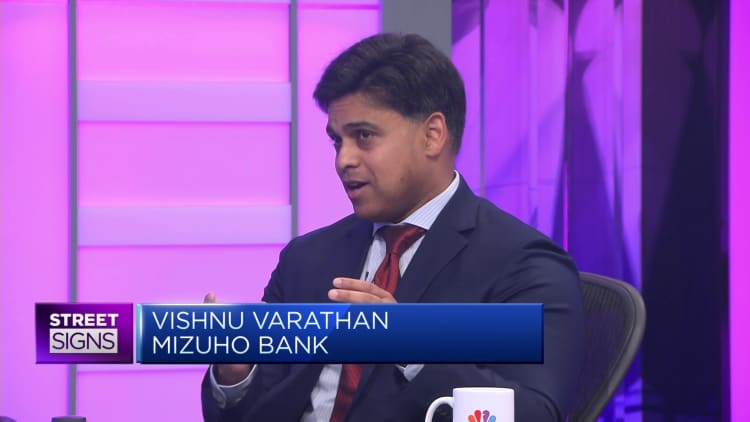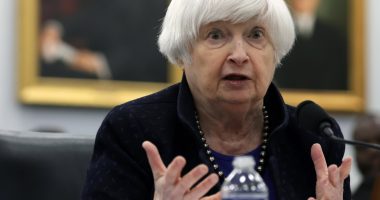The flags of China, U.S. and the Chinese Communist Party are displayed in a flag stall at the Yiwu Wholesale Market in Yiwu, Zhejiang province, China, May 10, 2019.
Aly Song | Reuters
BEIJING — China and the U.S. are working toward creating a more stable and predictable environment for businesses, Chinese Commerce Minister Wang Wentao said Friday.
Since U.S. Commerce Secretary Gina Raimondo’s visit to China last summer, the two countries have agreed to hold regular meetings at the ministerial level and below. Wang and Raimondo had a call earlier this month.
That communication “strives to create a good environment for the two countries’ economic and trade cooperation, especially in stabilizing business expectations,” Wang said in Mandarin at a press conference, translated by CNBC.
He did not mention U.S. tech restrictions, but said sanctions bring business uncertainty and “greatly increase” compliance costs.
In the last two years, the Biden administration has issued export controls that limit the ability of Chinese companies to buy advanced tech such as high-end semiconductors from U.S. businesses. Washington has said it’s a way to keep China’s military from accessing cutting-edge tech, while maintaining areas of cooperation.

“We always believe that the common interests of China and the U.S. in economy and trade are far greater than their differences,” Wang said.
U.S. and other foreign businesses in China have long complained of challenges to doing business in the Asian country, such as unequal treatment of foreign companies compared to local players. More recently, international businesses have said Beijing’s vague rules around data transfer out of the country make operations difficult.
In the fall, the Cyberspace Administration of China (CAC) issued new draft rules that said no government oversight is needed for data exports if regulators haven’t stipulated that it qualifies as “important.” The move was widely seen as an improvement for foreign businesses, but no official policy has yet followed.
When asked Friday for an update on data rules, Wang only said the “primary ministry is stepping up efforts to release them.”
He said China has acted on a 24-point plan released last summer for supporting foreign businesses in the country — with implementation or progress on “more than 60%” of the measures. Wang also said the ministry has set up regular channels for foreign businesses to share feedback.
When Raimondo visited China last year, she called for more action to improve predictability for U.S. businesses in China. Referring to the 24-point plan, she had said: “Any one of those could be addressed as a way to show action.”
Growing international challenges
China’s economic growth has slowed from the double-digit pace of prior decades to a 5.2% increase in 2023. Growth is expected to slow further this year.
Wang told reporters Friday that this year, the international trade situation would be “even more complex and severe,” pointing to factors such as increased geopolitical tensions.
Foreign direct investment fell by 8% to 1.13 trillion yuan ($160 billion) in 2023, the lowest level in three years, according to Ministry of Commerce data. It did not specify how much the U.S. invested in China, while noting France and the U.K. saw the largest increases in such investment last year.
China has sought to bolster foreign investment in the country.
At World Economic Forum’s annual conference in Davos, Switzerland, earlier this month, Chinese Premier Li Qiang gave a speech that portrayed China as an opportunity instead of a risk.
“Davos is littered with CEOs who have stories of intellectual property ripped off, agreements summarily changed, arbitrary legal judgments in favor of local competitors, and more,” Ian Bremmer, founder and president of the Eurasia Group, said in a note Monday.
“But I was also impressed by the breadth of CEOs — across a wide degree of sectors (finance, healthcare, insurance, manufacturing, technology, luxury goods, transition energy and more) who told me stories not just of increased access over the past months, but also new business terms, licenses and partnerships that they were legitimately enthusiastic about,” Bremmer said.
He said that “almost every Fortune 500 CEO with a business in China” that he met there was planning to travel more to China this year compared to last year.
“Even at 2-3% growth, a change in political impulse from the world’s second largest economy with large scale industrial infrastructure and a massive consumer base isn’t to be ignored.”
Read More: World News | Entertainment News | Celeb News
CNBC










